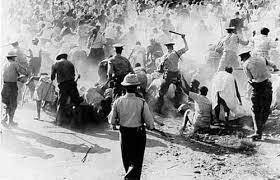On this page, we identify 5 human rights that were violated in the Sharpeville Massacre:
The Sharpeville Massacre, which took place on March 21, 1960, in Sharpeville, South Africa, was a tragic event that highlighted the gross violation of human rights perpetrated by the apartheid regime. This article aims to identify the human rights that were violated during the Sharpeville Massacre and shed light on the significance of this event in the struggle against racial segregation and injustice.
Highlights:
5 human rights that were violated in the Sharpeville Massacre were:
- Right to Life
- Freedom of Assembly and Association
- Freedom of Expression
- Protection from Torture and Cruel, Inhuman, or Degrading Treatment or Punishment
- Non-Discrimination
FIVE Human Rights that were Violated in the Sharpeville Massacre
- Right to Life: The most egregious violation during the Sharpeville Massacre was the denial of the right to life. The South African police opened fire on a peaceful protest organized by the Pan Africanist Congress (PAC) against the pass laws, resulting in the killing of 69 protesters, including women and children. This brutal act demonstrated a blatant disregard for the right to life and the use of excessive force by the state against unarmed civilians.
- Freedom of Assembly and Association: The right to freedom of assembly and association was severely violated during the Sharpeville Massacre. The peaceful gathering of protesters was met with violence and repression by the police, who sought to suppress any dissent against the apartheid regime. The right of individuals to peacefully assemble and associate was undermined, highlighting the oppressive nature of the apartheid system.
- Freedom of Expression: The Sharpeville Massacre also witnessed a violation of the right to freedom of expression. The protesters were peacefully expressing their opposition to the pass laws, which required Black South Africans to carry identification documents and restricted their movement. The use of force to suppress their dissent exemplified the apartheid government’s efforts to silence any form of criticism or opposition.
- Protection from Torture and Cruel, Inhuman, or Degrading Treatment or Punishment: The use of excessive force by the police during the Sharpeville Massacre resulted in the violation of the right to be free from torture and cruel, inhuman, or degrading treatment or punishment. The unarmed protesters were met with live ammunition, resulting in numerous injuries and deaths. The brutal treatment inflicted upon them represented a clear violation of their basic human rights.
- Non-Discrimination: The apartheid system itself was inherently discriminatory and violated the principle of non-discrimination. The pass laws targeted Black South Africans, subjecting them to additional restrictions and discrimination based on their race. The Sharpeville Massacre highlighted the discriminatory nature of the apartheid regime and the systematic denial of equal rights to Black South Africans.
Video: Sharpeville massacre was turning point in anti-apartheid movement
Conclusion
The Sharpeville Massacre was a tragic event that exposed the extent of human rights violations perpetuated under the apartheid regime in South Africa. The denial of the right to life, freedom of assembly and association, freedom of expression, protection from torture, and non-discrimination were among the key human rights that were violated during this tragic incident. The Sharpeville Massacre served as a turning point in the struggle against apartheid, galvanizing both national and international opposition to racial segregation and contributing to the eventual dismantling of the oppressive system. It remains a stark reminder of the importance of safeguarding and promoting human rights for all individuals, irrespective of their race or background.

